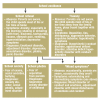School avoidance from the point of view of child and adolescent psychiatry: symptomatology, development, course, and treatment
- PMID: 20165699
- PMCID: PMC2822958
- DOI: 10.3238/arztebl.2010.0043
School avoidance from the point of view of child and adolescent psychiatry: symptomatology, development, course, and treatment
Abstract
Background: A considerable percentage of children and adolescents who avoid school have mental illnesses. This article reviews the typical manifestations, classification, development, course, and treatment of school-avoiding behavior.
Methods: Based on a selective review of recent literature, we present findings on the psychopathologically relevant features of school-avoiding children and adolescents, including psychiatric diagnoses, developmental, family-related, and psychological test variables. The emphasis is placed on our own studies of the subject.
Results: Although the evidence from the studies that have been performed to date is not definitive, the available findings show that school avoidance is associated with poor mental health and with unfavorable consequences onward into adulthood. Its causes include a number of individual and social stressors that place excessive demands on the affected children and adolescents and lead them to avoid school as a coping attempt.
Conclusions: Many preventive and therapeutic interventions are now available, but the existing measures need to be better coordinated, and more effort needs to be directed to the early recognition and treatment of school-avoiding behavior. Physicians should consider the possibility of mental illness. Rather than writing sick notes or prescribing mother-child treatments at health resorts, which rather tend to sustain the problem, they should refer patients promptly to a child and adolescent psychiatrist.
Figures
Comment in
-
Correspondence (letter to the editor): Pathophorias-A common cause of learning disabilities and school failure.Dtsch Arztebl Int. 2010 May;107(20):360; author reply 360. doi: 10.3238/arztebl.2010.0360a. Epub 2010 May 21. Dtsch Arztebl Int. 2010. PMID: 20539808 Free PMC article. No abstract available.
References
-
- Weiß B. Wer schwänzt wie häufig die Schule? Eine vergleichende Sekundäranalyse auf Grundlage von 12 deutschen Studien. In: Wagner M, editor. Schulabsentismus. Soziologische Analysen zum Einfluss von Familie, Schule und Freundeskreis. Weinheim: Juventa; 2007. pp. 37–56.
-
- Lehmkuhl U, Lehmkuhl G. Schulverweigerung - ein heterogenes Störungsbild. Bundesgesundheitsblatt für Gesundheitsforschung und Gesundheitsschutz. 2004;47:890–895. - PubMed
-
- Jans T, Warnke A. Schulverweigerung. Monatsschrift Kinderheilkunde. 2004;152:13002–13012.
-
- Keraney CA. A functional appoach to assessment and treatment. Washington, DC: American Psychol-ogical Association; 2001. School refusal behavior in youth.
-
- King NJ, Bernstein GA. School refusal in children and adolescents: A review of the past 10 years. Journal of the American Academy of Child and Adolescent Psychiatry. 2001;40:197–205. - PubMed
Publication types
MeSH terms
LinkOut - more resources
Full Text Sources
Medical



